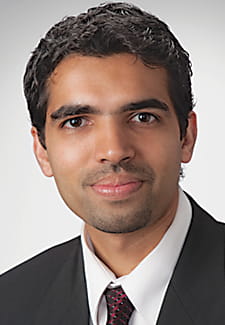Password Reset
Forgot your password? Enter the email address you used to create your account to initiate a password reset.
Forgot your password? Enter the email address you used to create your account to initiate a password reset.
3 Minutes

Chethan Puttarajappa, MD, MS, a transplant nephrologist in the Renal-Electrolyte Division, secured a National Institutes of Health K08 career development award (1K08DK119576) that will allow him to continue his renal transplantation research.
Dr. Puttarajappa’s K08 award, “Utility of Virtual Crossmatch in Deceased Donor Kidney Transplantation,” seeks to improve organ utilization along with maximizing function and longevity of transplanted kidneys to allow more patients with end-stage kidney disease to benefit from kidney transplantation. This research will use a combination of health services research methods and decision analysis to identify optimal crossmatch strategies in deceased donor kidney transplantation (DDKT).
The 2014 kidney allocation system (KAS) gave high priority to highly sensitized (i.e., higher calculated panel reactive antibody or PRA) waitlisted candidates and allowed for wider sharing of kidney donor profile index > 85 kidneys, resulting in increased shipping of organs, higher non-local kidney transplant surgeries, and increased cold ischemia time (CIT). To assess donor-recipient compatibility and avoid immediate transplant rejection, a physical cell-based crossmatch (XM) is routinely performed prior to KT. Physical XM has the risk of false positive results and may increase cold ischemia time (CIT), particularly for organs imported from a non-local Organ Procurement Organization. Virtual crossmatch (VXM) allows for rapid assessment of donor-recipient compatibility by comparing donor and recipient human leukocyte antigen (HLA) information. VXM has the potential to decrease CIT in DDKT, which will reduce delayed graft function rates and improve transplant outcomes. Reducing false positive XM and CIT could also reduce organ discard and improve organ utilization.
Specific aims of Dr. Puttarajappa’s research are: 1) Evaluate the current crossmatch practices in DDKT among different donor and recipient subgroups, along with assessing perceptions of transplant professionals regarding VXM; 2) Explore whether the use of VXM is associated with lower CIT and DGF, and whether this is different before and after the introduction of KAS; and 3) Explore whether routine application of VXM prior to DDKT has the potential to improve patient outcomes.
Dr. Puttarajappa’s research aims to identify situations in DDKT where a VXM alone can be used to safely proceed to transplantation without a physical XM. Modeling results will aim to quantify risks and benefits of omitting a physical XM in specific scenarios that differ in key patient and immunological risk categories. Additionally, findings on national crossmatch practice variation and perceptions of the transplant community towards VXM will help direct future research, changes to histocompatibility testing protocols, and health policy surrounding kidney transplantation.
Dr. Puttarajappa will be mentored in his research by kidney transplant outcomes research expert Sundaram Hariharan, MD; mathematical modeling and decision analysis experts Kenneth Smith, MD, MS, and Mark Roberts, MD, MPP; and survey methodology and donor research mentor Howard Degenholtz, PhD.